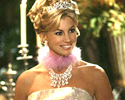|
Movie Review: 'The Stepford Wives'
by Rich Brooks
13 June 2004
The Stepford Wives was a short tongue-in-cheek novel written by jew Ira Levin in 1972 and made into the classic sci-fi/horror film in 1975. As a result of that movie, "Stepford wives" has come into our vocabulary as a derisive shorthand term referring to a 1950s-style stay-at-home mother and housewife. I've heard Mormon women, for instance, described as "Stepford wives" (and with, some measure of truth, I must admit). I'm sure that this was no accident, and that it was the intent of both novelist and film director to convey a feminist propaganda message. Nevertheless, the 1975 movie was a decent suspense thriller and did not lay on the message too thickly. There were a couple attempts to make sequels, but both were inferior products and failed miserably at the box-office as is so often the case with sequels.
Now, almost 30 years later, Hymiewood is again attempting to cash in on the popularity of the original movie by doing a remake with a big-name cast. Apparently they have been successful, because the Sunday matinee I attended drew a fairly large audience, most of whom looked old enough to remember the original film. Apparently also, the film pleased this older audience, because it evoked a good bit of laughter.
This laughter was intentional, because "The Stepford Wives" 2004 was remade as a comedy and there are a few genuinely funny scenes and jokes. The humor, however, comes at the expense of any sense of horror and mystery that were hallmarks of the original film. Also, the robot-like characteristics of these new "wives" are much more exaggerated and the Betty Crocker images made even more ludicrous. In the original film, the viewer only gradually comes to sense that something is not quite right in Stepford and things are a little "too perfect," but in the remake these women are much more obvious and broadly-drawn caricatures. Also the men are now shown as even more chauvinistic than ever, but some of their lines were good for a few laughs and I'm sure the thought crossed the minds of a few males in the audience that Stepford wouldn't be too bad a place to live.
  
Stepford, for those of you not familiar with the story, is a fictional town in wealthy suburban Connecticut where all of the women are dutiful wives and mothers who take pleasure in performing their household duties of cooking, cleaning and decorating. These "Stepford wives" always keep themselves attractive and well-groomed, and are never seen in anything but a dress -- in obviously sharp contrast to the slovenly "liberated" women we see all around us here in the 21st Century. The jews, I believe, want to see AmeriKwan women look like slobs in their appearance just as they wish to see them act like sluts in their morals.
There are some good comedic performances from stars Meryl Streep and Christopher Walken, who play the husband and wife team responsible for Stepford's creation as a "perfect" upper-class gated community. The town is much more opulent than in the original, and everyone here now lives in a mansion. But to me, depicting such extreme wealth takes away some of the impact of the story, because I believe it was originally intended as a commentary on middle-class Republican America. All Stepford wives, we learn, were in their former lives successful corporate executives who overshadowed their husbands' achievements.
Matthew Broderick and Nicole Kidman play the younger couple who are Stepford's newest residents. Kidman's character Joanna Eberhard is at the start of the movie a high-powered television network executive who is suddenly fired from her job when she commits a major screw-up. There is some mildly funny satire directed at the TV industry, but none that will in any way disturb the jews. Anyway, Joanna and husband Walter decide to leave the New York rat race and settle in Stepford, just as the couple in the original movie made a similar move. By coincidence, Joanna meets her old feminist friend Bobbie Markowicz; a shrill, unkempt, fag-loving jewess played by the shrill, unkempt and fag-loving jewess Bette Midler. Midler is perfectly cast for the part and comes off with some good lines, I must admit. I was anxious to see how she would act once she had had her "makeover," and I wasn't disappointed. It was a little fun, in fact, to see her big jewish mouth quieted as she was "Stepfordized."
And, oh yes, there is a homosexual "couple" prominently featured in this remake that was totally absent in either the book or the original movie. Can't make a comedy in 2004 without one. There is only one nigress among the "wives," however, and we never see a non-White couple on the screen. "Why this curious lack of 'diversity'?" you might ask. Very simple. To depict a multicultural array of nigger and mud robot people would take away from the central message of the film, which is an indictment of traditional, homogeneous White society.
And that's what "The Stepford Wives" 2004 basically is, despite the fact it is funnier and not nearly as heavy-handed about it as "Pleasantville." The new ending, which I unapologetically give away here, has a "poetic justice"-type role reversal, with the husbands dutifully all pushing around grocery carts while the wives are now giving orders. Fits in perfectly with the jew-promoted demasculinization of the AmeriKwan male which Hymiewood and televitz have been pushing for so many years.
It is also an indisputably jewish production, with Frank Oz (born Oznowicz) directing and names like Grunfeld, Rudin and Scherick listed as producers. Screenwriters were Ira Levin and Paul Rudnick and the film was released by Steven Kikeberg's Dreamworks. Those readers who remember the 1975 movie might wish to see this new version for sake of comparison. My advice would be to wait until it is released as a cheap video rental or makes its inevitable appearance on the joo toob.
RICH BROOKS
---------------------
Visit White Alert here.
|